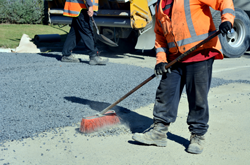 If you’re thinking about sustainable asphalt projects, rubblizing is one of the key methods for sustainability you’ll need to know.
If you’re thinking about sustainable asphalt projects, rubblizing is one of the key methods for sustainability you’ll need to know.
What Is Rubbilization?
Instead of simply laying asphalt over concrete, rubblizing turns that concrete pavement into rubble that can be used in the current project.
Rubbilization is now becoming the recommended method to repair and replace concrete pavements due to quality of work, and sustainability. In fact, it’s one of the preferred methods we at BASIC would recommend.
Why Is Rubbilizing Sustainable?
In general, this is a very environmentally friendly process. Instead of having to haul the concrete away and haul additional product to the site to use as a base, you’re using what’s already there. With nothing needed to haul away, there is no waste going in landfills.
The sub base of the existing surface can be left entirely intact, leading to a stronger pavement - and lower costs! Many methods of rehabilitizing pavements will disturb the existing environment. Rubbilizing is noted as the method that causes the most minimal disturbance to the environment, with underground utilities not being affected at all.
Why Else Should You Choose Rubblization?
Rubblization should be considered for every concrete replacement project. You could leave the existing concrete and pave asphalt over it - but then you have to deal with such potential problems as the concrete joints expanding underneath the asphalt, causing cracks in the future. The same joints also require more asphalt to be used in the process of creating an even surface. Rubbilization creates a smoother, more even surface.
As we’ve mentioned, choosing rubblization saves many costs. It can be estimated that rubbilization is 50% less expensive than other methods. Less materials need to be hauled to and from the paving site. In addition, this is a much faster process than any other method. This speed also turns into fewer costs. For projects such as highways, this means lane closures are only temporary - leading to less disruption, and less employee time needed.
Rubbilization is a great choice not only for sustainability, but for better managed, more durable projects.


